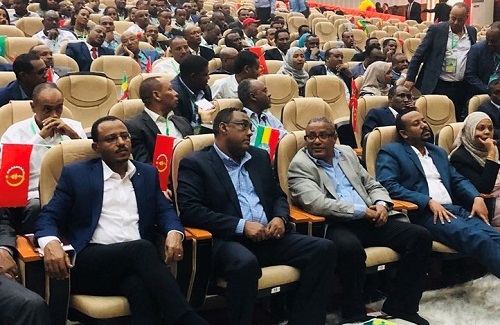EO photo
By
Fanuel Lakew
In Ethiopia, there have been a lot of changes since the administration of Abiy Ahmed came to power. The changes forced political parties to review their political agenda in the pursuit to win the hearts of the people in various ways.
The ruling party, Ethiopian Peoples’ Revolutionary Democratic Front (EPRDF), on its part, has been striving to keep its credibility. It is because, unlike previous times, there will be tough competition among political parties as the playing field seems somehow widened.
The EPRDF held its 11th organizational congress in Hawassa recently and came up with seven-point resolutions regarding the ongoing political changes.
Consolidating the multiparty system by widening the democratic space and ensuring individual and collective rights, creating national consensus, ensuring rule of law and strengthening the federal system, securing the stability macro-economy by boosting production and productivity are among the major points of the resolution.
Political experts have a say in this matter as the country is in a decisive moment to determine its fate. Approached by this reporter, experts comment on the resolutions:
Ghetnet Metiku, lecturer at the Ethiopian Civil Service University says the 11th organizational congress of the EPRDF did not officially come up with any fundamental changes to the Front’s program or statutes. However, it has been the most significant to date.
“One can simply look at the level of public attention it attracted making it more than a mere organizational affair. This uniqueness is reflected in the seven points composing the resolution whose keywords include: reform, national consensus, broadening democratic space, and rule of law.”
Ghetnet notes that the implication of the Congress is manifold. As to him, the resolution confirms the creation of consensus within the top EPRDF leadership on the need for protecting and taking forward the reform process. This would give the change leadership more impetus to play out its commitment to take the role of a ‘transition authority’ that is broader than party or ideology.
The establishment of a national consensus has truly come forward in the EPRDF agenda in a practical shift from formal perspectives of democracy to a more deliberative and consensus-based one, Ghetnet also says adding it is indicative of the leadership’s willingness to adopt a less confrontational approach in its relationship with other political actors.
Pertaining to broadening a democratic space, Ghetnet further notes that it has been left out of the ‘options-on-the-table’ for the EPRDF in its relationship with other political actors at least in practice. But now it has made a major come back along with the pursuit of more genuine multi-party democracy, he says.
“The emphasis on ensuring the rule of law, not only in terms of the more traditional conception vis-à-vis dealing with anarchy but also protecting the rights of citizens as well as using legal channels to resolve identity issues, indicates alignment of the leadership’s perspective with the current realities and context of the change process.”
To realize the resolutions, Ghetnet emphasizes that the focus of the next set of measures should be providing an institutional face to the national consensus and broader political space. This would involve finalizing ongoing changes and amendments to the policies, laws and institutions to enable a democratic process.
In doing so, the change leadership should give due attention to a number of emerging issues that require resolution as a matter of priority such as citizen participation and public engagement in the democratic process, the independence of the courts and democratic institutions, the role of media and civil society, and the like.
Furthermore, President of Lem Ethiopia, an Environment and Development Society, Dr Costantinos Berhutesfa points out that the highlights of the resolutions point to the consensus on the huge responsibility trusted upon them to protect the reform that has entered a new chapter since PM Abiy came to power.
Stating that while an important component of democracy, election and multiple political parties are not a guarantee for the political transition, he goes on to say that institutional approaches to the study of democratic reforms in Africa call for analysis of the effectiveness of government and non-state organizations in contributing to the reforms in terms of the generic characteristics of the organizations.
“The characteristics include autonomy, capacity, complexity, cohesion and a combination of these. Presumably, the more organizations and institutions are endowed with these attributes, the greater their strength, and the more likely they are to promote political transition,” he added.
In many countries, independent state mechanisms have been established to promote and protect human rights as a key element of this participative system, Dr Costantinos said that adding human rights education is also central to nurturing democratic spaces and contributing to the creation of an enabling environment through preventative strategies. In States in transition, where democratic space is nascent or limited, the protection of these freedoms is a test of political will and capacity for change.
Fanuel Lakew
Fanuel Lakew is a reporter at the Ethiopian Herald Newspaper of the Ethiopian Press Agency. He did his B.A. degree in Political Science and International Relations from Addis Ababa University in 2012. He also served as the Secretary-General of the Ethiopian Political Science and International Relations. He as well studied M.A. in Politics and International Relations at the Central University of Gujarat, India. He can be reached at [email protected]



No Comments Yet!
You can be first to comment this post!